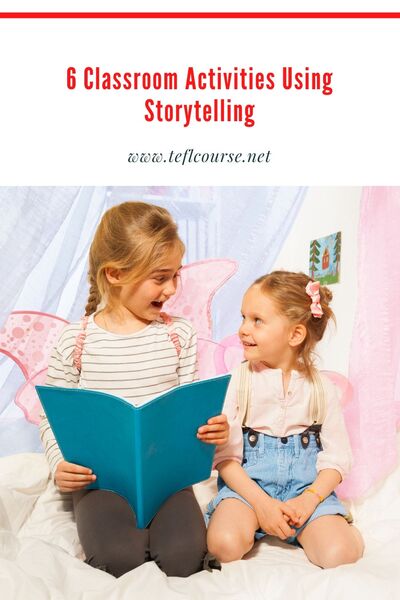6 Classroom Activities Using Storytelling

Who doesn't love a story? Stories are universal. Stories connect us all. Stories also transcend caste, creed, color, and age. From the beginning of time, to-date the medium may have changed but stories engage us with others because it is easy to see ourselves reflected in them and understand the message conveyed easily.
Table of Contents
Do you want to teach English abroad? Take a TEFL course today
This post was written by our TEFL certification graduate Shaimuna C. Please note that this blog post might not necessarily represent the beliefs or opinions of ITTT.
Teaching English using stories can be very effective in class. As an English teacher, I have used stories for classroom activities from Year 1 to 6 at the primary school level. The different age groups need diverse styles. Below are some of the activities that have worked well for my students.
USING PICTURES:
Material: pictures/glue stickEvery learner gets the same picture to stick in their notebooks. An ice breaker follows by asking the student to describe what they see in the picture in several words. This is very useful when teaching parts of speech (nouns, adjectives, prepositions) or even tenses (future simple vs. continuous). Each student contributes a sentence about the picture and it is put on the board. The sentences are then sequenced by the class in turns to make a good story. A title for the story is democratically agreed upon. The lesson would take at least two hours.
Also Read: The Difference Between Teaching ESL and Teaching EFL
STORY CIRCLE:
Material: students/tape recorderOne student starts a story with a few sentences. The next learner then picks up the thread and continues. Once all the students have contributed their input to the chain the story is completed. The story is then improvised with guidance from myself. The story can be recorded, videotaped, or written on a flipchart for the students to understand areas of improvement in their writing skills.

STORYBOARDS:
Material: pictures/notebooks/glueFor young learners, storyboarding is loved as the visualization is presented to them. A set of pictures in the sequence is given to paste in each child's notebook. They then write individual stories using their imagination and creativity. For the higher levels, an aspect of grammar can be included.
Also Read: How do I choose a TEFL course?
DIFFERENTIATED LEARNING:
Material: PresentationI show a traditional tale as they are a great vehicle for discovering and comparing stories from other cultures. Through discussion, students can then pick and list the similarities and differences of values and beliefs practiced. The students can develop a further understanding of role-play activities.
GUIDED LISTENING:
Material: ComprehensionI read aloud a story. All students listen carefully. After the story is completed, each student should now remember at least one character from it, draw and describe using grammar concepts (adjectives). This activity allows every student to write at the level of their understanding and content. They develop listening skills which in turn support their growth of literacy skills.
Also Read: Why I Did Volunteer Teaching in Nepal and You Should Too
USING SONGS:
Material: songsWe all grow up on nursery rhymes. Students love rhythm. They enjoy a song and the activity keeps them in active learning mode as it is fun and enjoyable. I hand the student's lyrics of a song with gaps in them. All students must try to fill in the blanks while listening to the song.There are so many activities that can be practiced using songs. Learning vocabulary, listening skills, pronunciation, and much more.
Do you want to teach English abroad? Take a TEFL course today
I have always enjoyed teaching using stories as it has always proved to engage children because they're naturally curious and learn actively.
Apply now & get certified to teach english abroad!
Speak with an ITTT advisor today to put together your personal plan for teaching English abroad!
Send us an email or call us toll-free at 1-800-490-0531 to speak with an ITTT advisor today.
Related Articles:
- NET Scheme for Teaching English in Hong Kong – How It Works and How To Apply
- Top 10 Things To Know When Moving Abroad To Teach English
- 7 Activities for Teaching Reported Speech in the ESL Classroom
- Why Prague Is The Ideal Place To Teach English
- Great Ideas for Teaching Listening Skills in the ESL Classroom




